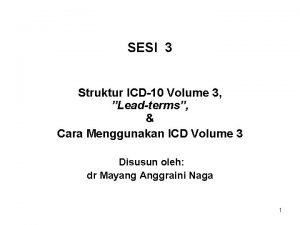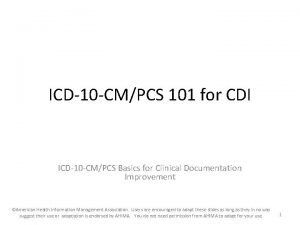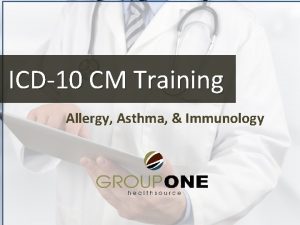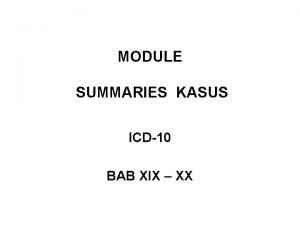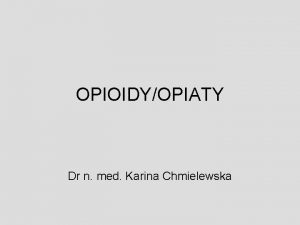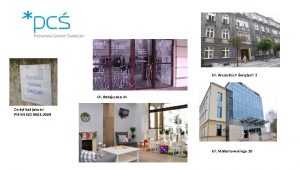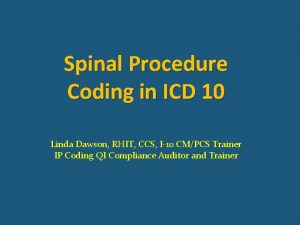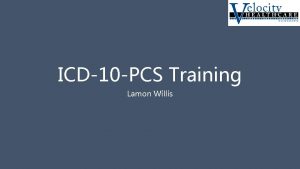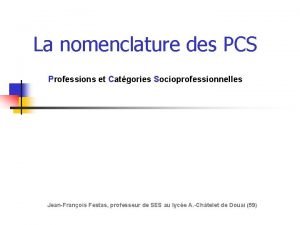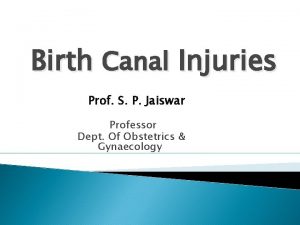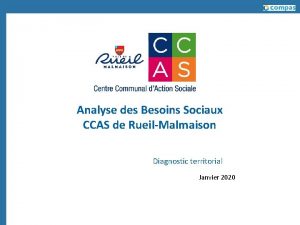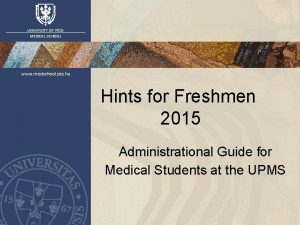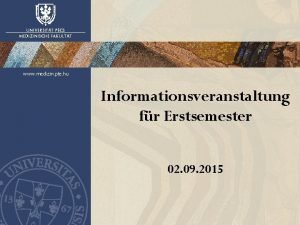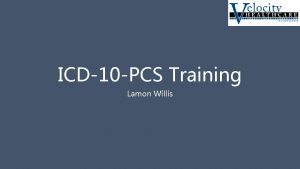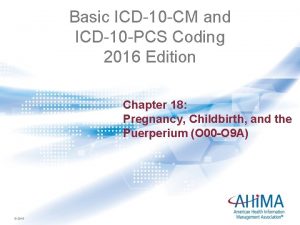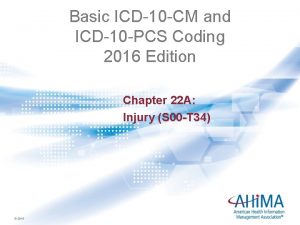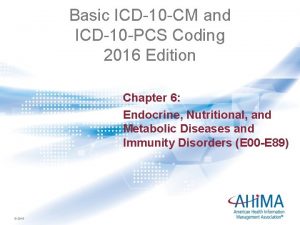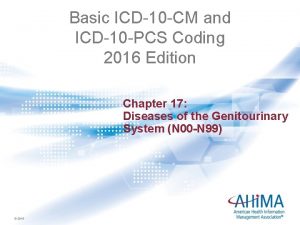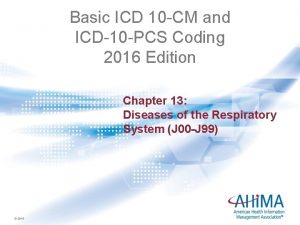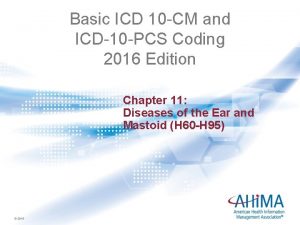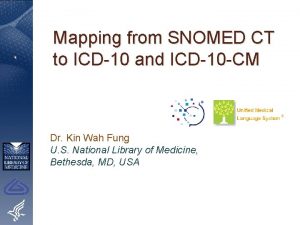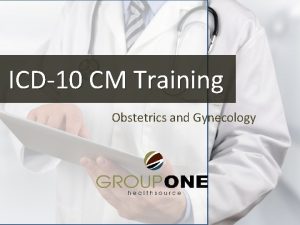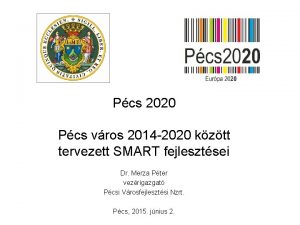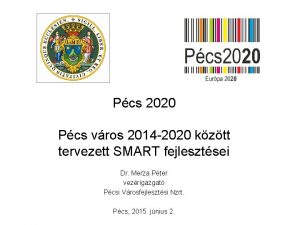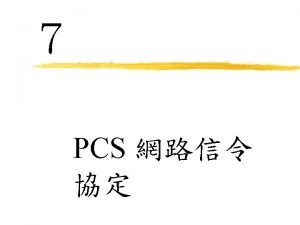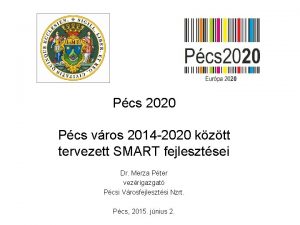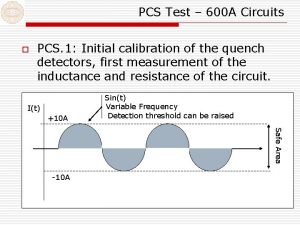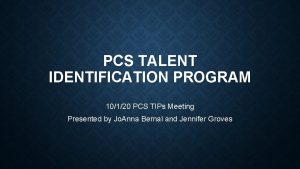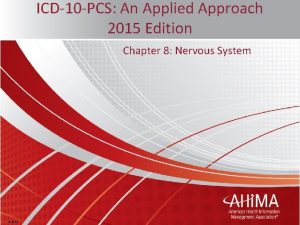The Impact of ICD10 CM and ICD10 PCS



























































- Slides: 59

The Impact of ICD-10 -CM and ICD-10 -PCS on Medical Documentation, Patient Safety And Quality Initiatives Taiwan Medical and Health Information Management Association Saturday, July 28, 2012 Nelly Leon-Chisen, RHIA, Director Coding and Classification American Hospital Association Lee H. Hilborne, MD, MPH, Medical Director, Care Coordination UCLA Health System Health Services Researcher RAND Corporation Medical Director Quest Diagnostics

Public Reporting Of Data Is A Driving Force • Transparency is a property of a high reliability organization • Many initiatives are emerging to evaluate and report quality of care and patient safety • Reported data serve four common interconnected purposes – Quality Improvement – Public Reporting – Pay-For-Performance – Research Copyright (c) 2012 by American Hospital Association. All rights reserved. 2

Where Does The Pressure Originate? • Employers – Reducing costs – Improving clinical quality – Comparative performance data available in the public domain (e. g. Leapfrog Group, National Business Coalition on Health) • Health plans – Data to describe providers’ and enrollee’s actions, costs, and health outcomes – Analysis of comparative performance data and pricing • Consumer concerns – Medical errors – Increased cost – Lack of coverage – Access to comparative performance Copyright (c) 2012 by American Hospital Association. All rights reserved. 3

Pay For Performance Is On Everybody’s Mind • Also called value based purchasing • Differential payment to hospitals and physicians based on 200 performance on a set of specified measures 150 – Quality 100 – Efficiency – Patient experiences 50 – Structural reforms (e. g. , 0 information technology) • Aligns financial incentives with delivery of high quality care • Rapidly expanding programs P 4 P Programs 2003 2006 Copyright (c) 2012 by American Hospital Association. All rights reserved. 2004 2008 2005 4

Private Sector Initiates Most Pay for Performance Programs • Most link relatively small bonus payments to better performance on specific process measures with outcome correlation • Focus on costly and relatively common conditions • Hospital “pay for performance” (P 4 P) experiments are run either by commercial plans or by employer-payer coalitions • Most include process and structure measures – Some include condition specific clinical outcome measures – But process measures are easiest to identify because what was actually done gets coded • Wide range of incremental revenue from successful performance—from less than 1% to 15% Copyright (c) 2012 by American Hospital Association. All rights reserved. 5

Pay For Performance Is A Centers for Medicare & Medicaid Priority • Shift in payment considerations – Payment traditionally based on the process of care (what was done) – P 4 P: Outcome influences payment (treatment impact); better outcomes paid more – Value-based purchasing • Goal – Right care for every patient every time – Conforms to Institute of Medicine (IOM) quality domains • Safe • Effective • Centered on the patient’s needs • Timely • Efficient • Equitable Copyright (c) 2012 by American Hospital Association. All rights reserved. 6

Medicare Programs Target Multiple Settings • Various initiatives to encourage improved quality of care in all health care settings: – Hospitals – Physicians’ offices – Ambulatory care facilities – Nursing homes – Home health care agencies – Dialysis facilities Copyright (c) 2012 by American Hospital Association. All rights reserved. 7

Quality Reporting Programs Working With CMS Are Dramatically Impacting Hospital Care • The Hospital Quality Alliance (HQA) – Created in 2002 as the USA’s first multi-stakeholder private/public organization dedicated to developing, reporting and updating information about hospital quality performance, and encouraging efforts to improve hospital quality. – Transferred the quality measure review processes to the Measures Application Partnership (MAP) in 2012. – Catalyzed adoption of the Hospital Consumer Assessment of Healthcare Providers and Systems (HCAHPS), the nation’s first standardized survey for measuring patients’ perceptions of their hospital care. – Introduced the nation’s first measures of surgical site infections. – Virtually all of the 10 core measures that the HQA first put forward now are above 95 percent compliance. – Advised CMS on the creation of Hospital Compare Copyright (c) 2012 by American Hospital Association. All rights reserved. 8

Quality Reporting Programs Working With CMS Are Dramatically Impacting Hospital Care (cont. ) • Hospital Compare www. hospitalcompare. hhs. gov – The nation’s broadest compendium of publicly available, internet accessible and comparable national hospital quality measures. – Currently reports on more than 50 performance measures for inpatient and outpatient care and allows the public and health care providers to compare the performance of more than 4, 500 hospitals across the nation. Copyright (c) 2012 by American Hospital Association. All rights reserved. 9

Addressing Quality Creates Data Challenges • Retrospective chart abstraction – Burdensome – Time-consuming – Mostly manual process – Able to collect more specific clinical measures • Administrative claims data – More efficient – Quality reporting as a by-product of the administrative process – Codes do not provide level of detail necessary – Concerns over accuracy of coded data Copyright (c) 2012 by American Hospital Association. All rights reserved. 10

We Focused On Patient Safety In Taiwan - 2003 11

We Agreed Safety Is Not New And Surely Not Unique to the USA “Grant me the courage to realize my daily mistakes so that tomorrow I shall be able to see and understand in a better light what I could not comprehend in the dim light of yesterday” Maimonides (1135 -1204) “I would give great praise to the physician whose mistakes are small for perfect accuracy is seldom to be seen” Hippocrates “…even admitting to the full extent the great value of the hospital improvements in recent years, a vast deal of the suffering, and some at least of the mortality, in these establishments is avoidable. ” Florence Nightingale, 1863 12

Safety Has Reached Our Patients’ Journals 13

Errors Made News In Taiwan Too United Daily News 2 December 2002 14

We Discussed Changing The Culture In Which We Practice • Vague/slippery concept – “How we get things done around here” – Unofficial organizing principles; the way problems are solved; organizational glue – We know it when we see it – It eats strategy for lunch • But there are some themes – Corporate self-esteem – Organizational structures that are important – How the organization views itself/outside world – Degrees of autonomy/collaboration, expectations, hierarchies of decision making 15

The Heart Of Culture Change In Medical Care • The idea that medical errors are caused by bad systems is a transforming concept • Complex systems have latent errors – Design of work – Conditions of work – Training – Design and maintenance of equipment • Must have clear responsibility to make the changes needed • Safety must trump personal preferences • Safety is everyone’s responsibility 16

We Have Made Progress, But Are Reminded We All Have Much More Work To Do… • Several high profile quality and patient safety issues have happened recently – In the United States – In Taiwan • These high profile issues highlight – The messages regarding safety and quality remain valid – We have to keep focusing the light on the issues – It’s not about our good intentions – it’s about what we do • Better data can help inform decisions and prevent errors 17

So Can Better Data Help Improve Safety and Quality? Clinical Concern Care Variation Health Services Research Evidence Based Guidelines Prioritize the Concern Measurement Protocols Select/Define Indicators Decision to Monitor Practice Performance Measurement Identify Best Performers Evaluate for Best Practices Disseminate Recs/Findings 18

ICD-10 -CM/PCS Potential • ICD-10 -CM/PCS codes have the potential to reveal much more about quality of care, which will help clinicians better understand complications, better designing of clinically robust algorithms, and better tracking of the outcomes of care. • The ability to more finely differentiate diseases may help analysts spot unusual patterns that would otherwise be lost in the broader categories. Copyright (c) 2012 by American Hospital Association. All rights reserved. 19

Impact of ICD-10 on Quality Measures • Quality measures will need to be translated • Issues related to translation • Clinical intent of the measure – The specificity of ICD-10 codes may alter the definition of a quality measure – ICD-10 coding conventions and guidelines can affect the patient populations included or excluded from a measure – Can the patient population be better identified using ICD-10? • Impact on existing trend data Copyright (c) 2012 by American Hospital Association. All rights reserved. 20

What If You Already Have Data In ICD-9 CM? • Data conversion issues • Does change reflect a true picture or an artifact of data conversion? • What about mapping? Copyright (c) 2012 by American Hospital Association. All rights reserved. 21

Hospital Value-based Purchasing Program Performance measure • Quality measures populations are defined – Heart attack care using ICD-9 -CM. Will need – Heart failure care to be re-specified with the more specific ICD-10 codes – Pneumonia – Surgical care – Patient safety – Hospital acquired conditions • Centers for Medicare & Medicaid (CMS) will evaluate hospitals both on their achievement on each measure during the “performance period” and the improvement in their performance from a “baseline period” to the performance period. • CMS will translate each hospital’s total performance score into an incentive payment. Copyright (c) 2012 by American Hospital Association. All rights reserved. 22

Hospital Value-based Purchasing Program • The Accountable Care Act (ACA) requires CMS to make publicly available hospital-specific performance information on individual measures, conditions or procedures, and overall scores. • CMS will publish on the Hospital Compare website hospital-specific information with respect to individual measure scores, condition-specific scores, domainspecific scores and total performance scores. Performance measure populations are defined using ICD-9 CM. Will need to be respecified with the more specific ICD-10 codes Copyright (c) 2012 by American Hospital Association. All rights reserved. 23

Quality Reporting Measures are Defined Using Clinical Codes • Joint Commission core measures • National Quality Forum endorsed measures • Physician Consortium for Performance Improvement (PCPI) measures • CMS demonstration projects • CMS Hospital Acquired Conditions (HAC) Diagnosis Related Groups (DRG) impact • State data reporting Performance measure populations are defined using ICD-9 -CM. Will need to be respecified with the more specific ICD-10 codes Copyright (c) 2012 by American Hospital Association. All rights reserved. 24

Accountable Care Organizations The more specific ICD-10 • Shared savings codes will help you – Encourages groups of providers to better understand the form accountable care organizations clinical picture of the (ACOs) to improve the quality and patients you treat and the efficient delivery of patient care and treatment you provide. to share in the cost savings they achieve with the Medicare program. Performance measure populations • Quality measures are defined using – 65 quality measures, the majority of ICD-9 -CM. Will need the measures do not overlap with the to be re-specified 56 quality measures (45 inpatient with the more and 11 outpatient) that hospitals specific ICD-10 currently report and require data codes collection from medical records or surveys. Copyright (c) 2012 by American Hospital Association. All rights reserved. 25

ICD-9 -CM and ICD-10 -CM/PCS Mapping • To facilitate the transition from ICD-9 -CM to ICD-10 -CM/PCS, mapping between the two coding systems has been developed. • The General Equivalence Mappings (GEMs) are used to facilitate linking between the diagnosis codes in ICD-9 -CM and the new ICD-10 -CM/PCS code sets. • The GEMs as well as the documentation and user’s guide are available online at: http: //www. cms. gov/Medicare/Coding/ICD 10/index. html Copyright (c) 2012 by American Hospital Association. All rights reserved. 26

General Equivalence Mappings (GEMs) • The GEMs are a comprehensive translation dictionary that can be used to accurately and effectively translate any ICD-9 -CM-based data, including data for: – Tracking quality; – Recording morbidity/mortality; – Calculating reimbursement; or – Converting any ICD-9 -CM-based application to ICD-10 -CM/PCS. • The GEMs can be useful for projects to convert large data sets. • They are not a substitute for learning how to use ICD-10 -CM or for selecting ICD-10 -CM codes. GEMs should be used with care and require understanding of ICD-9 -CM as well as ICD-10, as well as the intent of the application or data being converted. Copyright (c) 2012 by American Hospital Association. All rights reserved. 27

ICD-9 -CM and ICD-10 -PCS Mapping • Documentation and user’s guide available online – Information on structure and relationships contained in the mappings to facilitate correct usage – Glossary of terms and conventions used in the mapping along with their accompanying definitions Copyright (c) 2012 by American Hospital Association. All rights reserved. 28

General Equivalence Mappings (GEMs) • They are not a substitute for learning how to use ICD 10 -CM or for selecting ICD-10 -CM codes. • The GEMs as well as the documentation and user’s guide are available online at: http: //www. cms. gov/Medicare/Coding/ICD 10/index. html Copyright (c) 2012 by American Hospital Association. All rights reserved. 29

Example of GEMs Translations: Single Code • Only one alternative in a GEM (“one-to-one” translation) – Are the codes identical? Copyright (c) 2012 by American Hospital Association. All rights reserved 30

Example of GEMs Translations: Multiple Code Alternatives • There may be multiple translation alternatives all of which are equally plausible depending on circumstances (e. g. burns). Copyright (c) 2012 by American Hospital Association. All rights reserved. 31

Example of GEMs Translations: ICD-9 Code Clusters • More than one ICD-9 code is required to equal a complete translation of one ICD-10 code Copyright (c) 2012 by American Hospital Association. All rights reserved. 32

Example of GEMs Translations: ICD-10 Code Clusters • More than one I-10 code is required to equal a complete translation of one I-9 code Copyright (c) 2012 by American Hospital Association. All rights reserved. 33

Number of ICD-9 and ICD-10 Codes for Diagnoses and Procedures 8 0 , 0 0 0 7 2 , 6 0 0 6 8 , 0 0 0 IC D -9 IC D -1 0 4 0 , 0 0 0 1 3 , 0 0 0 0 D ia g n o s is c o d e s P ro c e d u re c o d e s What does the additional detail provide for quality reporting? Copyright (c) 2012 by American Hospital Association. All rights reserved. 34

ICD-10 -CM Code Examples NQF Seriously reportable events in healthcare: Patient death or serious disability associated with the use or function of a device in patient care in which the device is used or functions other than as intended. ICD-9 -CM 996. 1 Mechanical complication of other vascular device, implant, and graft ICD-10 -CM 9 codes differentiating aortic graft, carotid arterial graft, femoral graft from catheters. Examples: T 82. 49 x. A Other complication of vascular dialysis catheter, initial encounter T 82. 591 A Other mechanical complication of surgically created arteriovenous shunt, initial encounter T 82. 593 A Other mechanical complication of balloon (counterpulsation) device, initial encounter T 82. 595 A Other mechanical complication of umbrella device, initial encounter Copyright (c) 2012 by American Hospital Association. All rights reserved. 35

ICD-10 -CM Code Examples NQF Seriously reportable events in healthcare: Patient death or serious disability associated with intravascular air embolism that occurs while being cared for in a healthcare facility ICD-9 -CM 999. 1 Complications of medical care, not elsewhere classified, air embolism (includes air embolism to any site following infusion, perfusion, or transfusion) or 996. 74 Other complications, due to vascular device, implant, and graft (includes embolism, fibrosis, hemorrhage, pain, stenosis) ICD-10 -CM T 80. 0 xx. A Air embolism following infusion, transfusion and therapeutic injection, initial encounter T 82. 818 A Embolism of vascular prosthetic devices, implants and grafts, initial encounter Copyright (c) 2012 by American Hospital Association. All rights reserved. 36

ICD-10 -CM Code Examples National Quality Forum Endorsed Quality Measure: Accidental Puncture or Laceration ICD-9 -CM 998. 2 Accidental puncture or laceration during a procedure ICD-10 -CM 21 codes indicating accidental puncture and laceration specifying organ or body system and type of procedure Examples: D 78. 11 Accidental puncture and laceration of spleen during a procedure on the spleen D 78. 12 Accidental puncture and laceration of spleen during other procedure Copyright (c) 2012 by American Hospital Association. All rights reserved. 37

ICD-10 -CM Code Examples ACO quality measure, MS-DRG hospital acquired condition, Hospital Value Based Purchasing Program measure: Foreign Body left after procedure ICD-9 -CM 998. 4 Foreign body accidentally left during a procedure • Includes adhesions, obstruction or perforation due to foreign body left accidentally during surgery ICD-10 -CM T 81. 525 D Obstruction due to foreign body accidentally left in body following heart catheterization, subsequent encounter T 81. 532 A Perforation due to foreign body accidentally left in body following kidney dialysis, initial encounter Plus 48 more unique codes specifying complications due to foreign body (splitting out obstruction, adhesions, perforations, and other complications) and some common procedures like surgical operation, endoscopic procedures, removal of catheter and infusion. Copyright (c) 2012 by American Hospital Association. All rights reserved. 38

ICD-10 -CM Code Examples Local Coverage Determination: Hyperbaric oxygen therapy includes indication of diabetic ulcer. ACO At-risk population measure, Diabetes mellitus foot exam ICD-9 -CM 250. 8 x Diabetes with other specified manifestations ICD-10 -CM E 10. 62 x or E 11. 62 x Type 1 or type 2 diabetes mellitus with foot ulcer or other skin ulcer + 707. x Chronic ulcer of skin Indication is captured in a single code instead of requiring the combination of 2 codes Copyright (c) 2012 by American Hospital Association. All rights reserved. 39

ICD-10 -CM Code Examples Local Coverage Determination: Percutaneous transluminal angioplasty includes indication of vascular graft stenosis ICD-9 -CM 996. 74 Other complications due to other vascular device, implant, and graft • ICD-10 -CM T 82. 858 Stenosis of vascular prosthetic devices, implants, and grafts Includes embolism, thrombosis, fibrosis, hemorrhage, pain, and stenosis Copyright (c) 2012 by American Hospital Association. All rights reserved. 40

ICD-10 -CM Code Examples Underdosing by (inadvertently) (deliberately) taking less substance than prescribed or instructed. Information may be useful to identify reasons for readmissions and prevent readmissions ICD-9 -CM Concept does not exist Code to condition ICD-10 -CM • T 38. 3 X 6 A Underdosing of insulin and oral hypoglycemic [antidiabetic] drugs, initial encounter • T 44. 7 X 6 A Underdosing of betaadrenoreceptor antagonists Copyright (c) 2012 by American Hospital Association. All rights reserved. 41

ICD-10 -CM Code Examples Patient noncompliance: Information may be useful to identify reasons for readmissions and prevent readmissions ICD-10 -CM ICD-9 -CM Z 91. 11 Patient's noncompliance with dietary regimen V 15. 81 Z 91. 120 Patient's intentional underdosing of medication Noncompliance regimen due to financial hardship with medical Z 91. 128 Patient's intentional underdosing of medication treatment regimen for other reason Z 91. 130 Patient's unintentional underdosing of medication regimen due to age-related debility Z 91. 138 Patient's unintentional underdosing of medication regimen for other reason Z 91. 14 Patient's other noncompliance with medication regimen Z 91. 15 Patient's noncompliance with renal dialysis Z 91. 19 Patient's noncompliance with other medical treatment and regimen Copyright (c) 2012 by American Hospital Association. All rights reserved. 42

ICD-10 -CM Code Examples AHRQ Patient Safety Indicators, Value Based Purchasing Complication/patient safety indicators: Postoperative respiratory failure ICD-9 -CM 518. 5 Pulmonary insufficiency following trauma and surgery ICD-10 -CM J 95. 82 Postprocedural respiratory failure Copyright (c) 2012 by American Hospital Association. All rights reserved. 43

Greater Specificity – Laterality Example CMS, Hospital Acquired Condition: Pressure ulcer ICD-9 -CM • 707. 05 Pressure ulcer buttock • 707. 22 Pressure ulcer stage II • 707. 24 Pressure ulcer stage IV • How many ulcers are there? ICD-10 -CM • L 89. 312 Pressure ulcer of right buttock, stage II • L 89. 324 Pressure ulcer of left buttock, stage IV • OR • L 89. 322 Pressure ulcer of left buttock, stage II • L 89. 314 Pressure ulcer of right buttock, stage IV Copyright (c) 2012 by American Hospital Association. All rights reserved. 44

ICD-9 -CM vs. ICD-10 -CM Sample Codes Tracking complications, what really happened, when? ICD-9 -CM 11. Hemorrhage complicating a procedure 12. Hematoma complicating a procedure ICD-10 -CM I 97. 410 Intraoperative hemorrhage and hematoma of a circulatory system organ or structure complicating a cardiac catheterization I 97. 611 Postprocedural hemorrhage and hematoma of a circulatory system organ or structure following cardiac bypass D 78. 01 Intraoperative hemorrhage and hematoma of spleen complicating a procedure on the spleen D 78. 02 Intraoperative hemorrhage and hematoma of spleen complicating other procedure Copyright (c) 2012 by American Hospital Association. All rights reserved. 45

ICD-10 -CM Code Examples National Quality Forum seriously reportable events in healthcare: Patient death or serious disability associated with hypoglycemia, the onset of which occurs while the patient is being cared for in a healthcare facility ICD-9 -CM 996. 57 Mechanical complication due to insulin pump ICD-10 -CM T 85. 614 Breakdown (mechanical) of insulin pump, or T 85. 624 Displacement of insulin pump, or T 85. 633 Leakage of insulin pump, or T 85. 694 Other mechanical complication of insulin pump Plus T 38. 3 x 6 - Underdosing of insulin and oral hypoglycemic [antidiabetic] drugs or T 38. 3 x 1 - Poisoning by insulin and oral hypoglycemic [antidiabetic] drugs, accidental (unintentional) Copyright (c) 2012 by American Hospital Association. All rights reserved. 46

ICD-9 -CM vs. ICD-10 -PCS Comparison Tracking procedures, what was done? ICD-9 -CM • 39. 31 Suture of artery ICD-10 -PCS • 02 QP 0 ZZ Repair pulmonary trunk, open approach • Plus 195 other codes based on – Approach • Open Endoscopic • Percutaneous Endoscopic – Body part • 67 different arteries Copyright (c) 2012 by American Hospital Association. All rights reserved. 47

ICD-9 -CM vs. ICD-10 -PCS Comparison National Quality Forum endorsed quality measure: Number of admissions for lower-extremity amputation among patients with diabetes. ICD-9 -CM 14. Amputation of ankle through malleoli of tibia and fibula 15. Other amputation below knee 84. 17 Amputation above knee ICD-10 -PCS Distinguishes between • Right and left foot • Complete foot only • Lower leg (low, mid or high) • Upper leg (low, mid or high) Examples: 0 Y 6 M 0 Z 0 Detachment at Right Foot, Complete, Open Approach 0 Y 6 C 0 Z 2 Detachment at Right Upper Leg, Mid, Open Approach 0 Y 6 J 0 Z 3 Detachment at Left Lower Leg, Low, Open Approach Copyright (c) 2012 by American Hospital Association. All rights reserved. 48

Number of ICD-9 and ICD-10 Codes for Diagnoses and Procedures 8 0 , 0 0 0 7 2 , 6 0 0 6 8 , 0 0 0 IC D -9 IC D -1 0 4 0 , 0 0 0 1 3 , 0 0 0 0 D ia g n o s is c o d e s P ro c e d u re c o d e s How does it affect documentation needs? Copyright (c) 2012 by American Hospital Association. All rights reserved. 49

Documentation Issues • ICD-10 requires more detailed documentation to specify aspects of diagnoses and procedures required for more detailed codes • Assess current documentation specificity • Physician education – not necessarily to obtain a more specific code, but for • Quality improvement • Clinical purposes • Patient safety Copyright (c) 2012 by American Hospital Association. All rights reserved. 50

Documentation Improvement Program • Work with your medical staff • Audit- what is the quality of your documentation today? • Are diagnoses and procedures documented in in sufficient detail for coding? • Are all significant secondary diagnoses properly documented? • Refine any existing Clinical Documentation Improvement programs to include ICD-10 -CM/PCS requirements • Will need support from administration Copyright (c) 2012 by American Hospital Association. All rights reserved. 51

Assess Current Workflow • Assess choices for provider documentation – Problem list – Pick list – templates – Free text – Dictation/speech recognition – Templates – Combination? Copyright (c) 2012 by American Hospital Association. All rights reserved. 52

Case of the Missing Documentation • Paper vs. electronic • Hybrid • Documentation in multiple locations – Difficult to find – Coders may need to log into multiple systems or paper – Easy to miss important information – Coders are too valuable to spend time playing detectives • Centralized records – Scanning – Electronic health records • Technology can be a coder’s best friend (if done right) • Enable remote chart reviews and audits • Dealing with shortage of qualified coders Copyright (c) 2012 by American Hospital Association. All rights reserved 53

Does Your Organization Code Minor Procedures? • Review/revise coding policies on what to code • Consider alternatives for obtaining required information required for minor procedures and where should the coding happen? Copyright (c) 2012 by American Hospital Association. All rights reserved. 54

Focus Coding and Documentation Gap Analysis • • Sample records Top MS-DRGs Most common surgical procedures Most active members of the medical staff (high volume admission/surgeries) Copyright (c) 2012 by American Hospital Association. All rights reserved. 55

Consider Solutions and Develop Plan • • • Technical solutions People solutions Identify physician and executive champions Consider existing venues for disseminating information What’s in it for the physicians? It’s not only about getting a code number for the hospital or the claim Copyright (c) 2012 by American Hospital Association. All rights reserved. 56

Query Forms • Will need to redesign physician queries. • Coders and documentation specialists most likely already know where the gaps in k documentation are – Engage them to watch for gaps and wor on closing those gaps now! • Review query form inventory Copyright (c) 2012 by American Hospital Association. All rights reserved. 57

Dictation/Transcription • Much more difficult (if not impossible in some instances) to code without an operative report • Do you want your coders to wait for the dictation and/or transcription of the report? • Filing (if working with paper) • Address any workflow deficiencies upfront Copyright (c) 2012 by American Hospital Association. All rights reserved. 58

Questions? Copyright (c) 2012 by American Hospital Association. All rights reserved. 59
 Luka bakar icd 10
Luka bakar icd 10 Kode icd 10 otitis media kronik
Kode icd 10 otitis media kronik Contusio cerebri icd 10
Contusio cerebri icd 10 Isi volume 3 icd-10 adalah
Isi volume 3 icd-10 adalah Icd-10 orthopaedics
Icd-10 orthopaedics Cdi icd10
Cdi icd10 Mild persistent asthma
Mild persistent asthma Icd10 sungsang
Icd10 sungsang Isrr icd 10
Isrr icd 10 Icd 10 microhematuria
Icd 10 microhematuria Armd icd 10
Armd icd 10 Bradykardia icd10
Bradykardia icd10 Pcs wszystkich świętych poznań
Pcs wszystkich świętych poznań Tofd pcs calculator
Tofd pcs calculator Foraminotomy
Foraminotomy Pcs advanced scholar
Pcs advanced scholar Critères de construction des pcs
Critères de construction des pcs Leaving cert subject choice
Leaving cert subject choice Posterior capsulotomy knee pcs code
Posterior capsulotomy knee pcs code History of cloud computing
History of cloud computing Azalea middle school dress code 2021
Azalea middle school dress code 2021 Pcs
Pcs Gorophic
Gorophic Periclitoral tear
Periclitoral tear Evolution des pcs
Evolution des pcs Aok pte curriculum
Aok pte curriculum Pcs back office
Pcs back office Scrip
Scrip Pcs symbols
Pcs symbols Pcs migration
Pcs migration Pcs 900
Pcs 900 Who owns metro pcs
Who owns metro pcs Pte medizin
Pte medizin Etr pte
Etr pte Metro basics
Metro basics Pcs szülés
Pcs szülés Ice candy business plan
Ice candy business plan Xxxspc
Xxxspc Hình ảnh bộ gõ cơ thể búng tay
Hình ảnh bộ gõ cơ thể búng tay Bổ thể
Bổ thể Tỉ lệ cơ thể trẻ em
Tỉ lệ cơ thể trẻ em Voi kéo gỗ như thế nào
Voi kéo gỗ như thế nào Glasgow thang điểm
Glasgow thang điểm Chúa sống lại
Chúa sống lại Môn thể thao bắt đầu bằng chữ đua
Môn thể thao bắt đầu bằng chữ đua Thế nào là hệ số cao nhất
Thế nào là hệ số cao nhất Các châu lục và đại dương trên thế giới
Các châu lục và đại dương trên thế giới Công thức tính thế năng
Công thức tính thế năng Trời xanh đây là của chúng ta thể thơ
Trời xanh đây là của chúng ta thể thơ Cách giải mật thư tọa độ
Cách giải mật thư tọa độ 101012 bằng
101012 bằng độ dài liên kết
độ dài liên kết Các châu lục và đại dương trên thế giới
Các châu lục và đại dương trên thế giới Thể thơ truyền thống
Thể thơ truyền thống Quá trình desamine hóa có thể tạo ra
Quá trình desamine hóa có thể tạo ra Một số thể thơ truyền thống
Một số thể thơ truyền thống Bàn tay mà dây bẩn
Bàn tay mà dây bẩn Vẽ hình chiếu vuông góc của vật thể sau
Vẽ hình chiếu vuông góc của vật thể sau Nguyên nhân của sự mỏi cơ sinh 8
Nguyên nhân của sự mỏi cơ sinh 8



